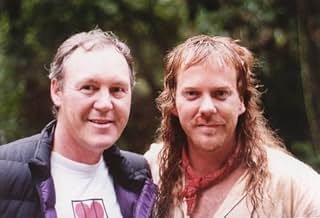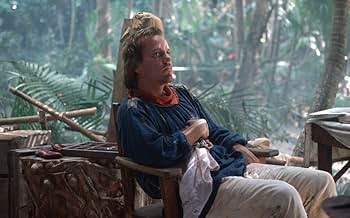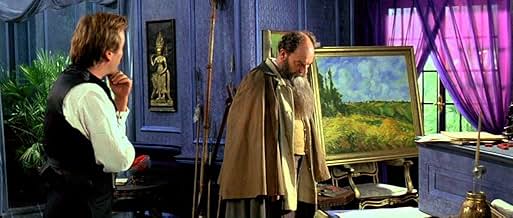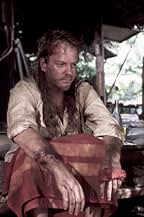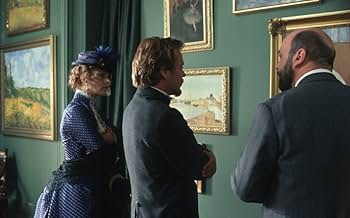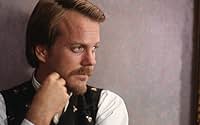IMDb-BEWERTUNG
5,7/10
702
IHRE BEWERTUNG
Füge eine Handlung in deiner Sprache hinzuA successful 19th century French stockbroker (Sutherland) leaves his profession to become an artist in Paris.A successful 19th century French stockbroker (Sutherland) leaves his profession to become an artist in Paris.A successful 19th century French stockbroker (Sutherland) leaves his profession to become an artist in Paris.
Jana Bittnerová
- Suzanne
- (as Jana Bittnerova)
Empfohlene Bewertungen
An absolutely dreadful rendition of Gauguin's life on Tahiti.There is no sense of his passion in a wonderful adventure in the South Seas and the real difficulties he faced.Having studied this painters life in some detail I find this biopiic unbelievably innacurate. We even have his wife Mette loving his paintings from Tahiti, which in reality she despised. There is even a scene of her at his exhibition in Paris, an event she refused to attend.She never appreciated any of his work. If a filmmaker or writer embarks on a biopic picture they need to keep the basic facts correct. The Directing and editing is very slow and not very entertaining. It is difficult to blame the actors with such a pedestrian script but I found the casting quite misguided. Gauguin must be quaking in his grave at this effort at portraying his brave and noble life in pursuit of his art.
Can anyone tell me of another film on Gauguin's life? While not as passionate as Lust for Life (van Gogh), I enjoyed seeing Paradise Found, and I saved it & have watched it several times now. I wanted it to go on longer.
In my 30s I painted several oils, & seeing this has inspired me to get out my brushes again. I wish more artists lives were available. William Blake, Turner, and others. PF was made by Australians, & I bet Hollywood would have changed the story line even more.
In my 30s I painted several oils, & seeing this has inspired me to get out my brushes again. I wish more artists lives were available. William Blake, Turner, and others. PF was made by Australians, & I bet Hollywood would have changed the story line even more.
This film, as far as I can remember, never had a commercial run here, or at least, this movie probably went to cable right after it's release in other countries. The idea of watching a biopic about Gauguin intrigued me since this painter had a turbulent career and his paintings, especially his Tahitian ones, revolutionized the art world.
As it has been pointed out by other contributors to this forum, Paul Gauguin had a difficult life. He was never clearly understood by his wife, or the general public he tried to conquer. He was a passionate man who left all the comforts in order to pursue an ambition that never gave him the happiness or economic security that others attained.
The screen play, not being linear, doesn't add much to the story. We are constantly taken back and forth, knowing little about the man. Paul Gauguin's family life was an unhappy one. His wife Mette never clearly understood him, nor stuck by him when he abandoned the brokerage house. Mette appears as a cold woman who never shared her husband's passion for the life he embarked.
Kiefer Sutherland's interpretation of the painter can go so far; he is hindered by an uninspired screen play. As far as his struggle with the local priest, who clearly wants to take the natives' culture away from them, is only a distraction. Actually, we see very little about the passion that consumed Gauguin during his time in Tahiti as he spends very little time doing what he went there for, in the first place: painting!
As it has been pointed out by other contributors to this forum, Paul Gauguin had a difficult life. He was never clearly understood by his wife, or the general public he tried to conquer. He was a passionate man who left all the comforts in order to pursue an ambition that never gave him the happiness or economic security that others attained.
The screen play, not being linear, doesn't add much to the story. We are constantly taken back and forth, knowing little about the man. Paul Gauguin's family life was an unhappy one. His wife Mette never clearly understood him, nor stuck by him when he abandoned the brokerage house. Mette appears as a cold woman who never shared her husband's passion for the life he embarked.
Kiefer Sutherland's interpretation of the painter can go so far; he is hindered by an uninspired screen play. As far as his struggle with the local priest, who clearly wants to take the natives' culture away from them, is only a distraction. Actually, we see very little about the passion that consumed Gauguin during his time in Tahiti as he spends very little time doing what he went there for, in the first place: painting!
Paradise Found (2003)
Paul Gauguin is a great artist, and his work is daring and beautiful. So whenever the movie lets the work show through--and it does several times--it rises to its best. And the man playing the artist, improbable as it is, is Kiefer Sutherland, who does a decent job. It's hard to say to what extent he is true to the real man--how can anyone know?--but he combines intensity and craziness in good measure.
And, to keep on the good notes, it's actually not so bad how German-born Nastassjia Kinski handles the Danish wife of Gauguin, Mette-Sophie. Several other characters make brief appearances, the one most famous is Pissarro played by Alun Armstrong, who I didn't know, but who is strong enough at making the Impressionist slightly out of touch with the changing tides of art. In fact, what the movie does accomplish is show some sense of the art scene in Paris from Gauguin's point of view, and Gauguin's friendship with Pissarro as a catalyst to his becoming a serious artist.
The story is told in interspersed flashbacks, which are distracting and almost arbitrary. It begins with Gauguin's arrival in Tahiti, then jumps back 17 years to Paris, then to Tahiti, back and forth uncountable times. And without reason, except to chop the movie up, as if a chronological telling would be dull.
More troubling is the depiction of Tahiti (and other islands in French Polynesia). It plays loose with facts. Historically, the islands were largely ruined and in disease from the colonists, not the idyllic paradise shown here, infested with a handful of soldiers and an excessively zealous Christian missionary. The struggle of the islanders to preserve their religious icons is overemphasized, and the struggle of Gauguin to land women and young girls for sex is underemphasized. He's passionate and troubled, broke and dirty. That is, he's an artist, through and through.
So it gets a bit tiring. And in fact, between all the little eruptions of energy and conflicting emotions, very little happens, really happens. And it's filmed plainly, to the point of being dull, cutting from person to person in conversation as if by formula. The sets are well done and sometimes quite beautiful, and they should have inspired a more intense visual approach. As the paintings themselves should have, too.
Paul Gauguin is a great artist, and his work is daring and beautiful. So whenever the movie lets the work show through--and it does several times--it rises to its best. And the man playing the artist, improbable as it is, is Kiefer Sutherland, who does a decent job. It's hard to say to what extent he is true to the real man--how can anyone know?--but he combines intensity and craziness in good measure.
And, to keep on the good notes, it's actually not so bad how German-born Nastassjia Kinski handles the Danish wife of Gauguin, Mette-Sophie. Several other characters make brief appearances, the one most famous is Pissarro played by Alun Armstrong, who I didn't know, but who is strong enough at making the Impressionist slightly out of touch with the changing tides of art. In fact, what the movie does accomplish is show some sense of the art scene in Paris from Gauguin's point of view, and Gauguin's friendship with Pissarro as a catalyst to his becoming a serious artist.
The story is told in interspersed flashbacks, which are distracting and almost arbitrary. It begins with Gauguin's arrival in Tahiti, then jumps back 17 years to Paris, then to Tahiti, back and forth uncountable times. And without reason, except to chop the movie up, as if a chronological telling would be dull.
More troubling is the depiction of Tahiti (and other islands in French Polynesia). It plays loose with facts. Historically, the islands were largely ruined and in disease from the colonists, not the idyllic paradise shown here, infested with a handful of soldiers and an excessively zealous Christian missionary. The struggle of the islanders to preserve their religious icons is overemphasized, and the struggle of Gauguin to land women and young girls for sex is underemphasized. He's passionate and troubled, broke and dirty. That is, he's an artist, through and through.
So it gets a bit tiring. And in fact, between all the little eruptions of energy and conflicting emotions, very little happens, really happens. And it's filmed plainly, to the point of being dull, cutting from person to person in conversation as if by formula. The sets are well done and sometimes quite beautiful, and they should have inspired a more intense visual approach. As the paintings themselves should have, too.
Being the die hard Sutherland fan that I am, I enjoyed this flick purely for his performance. The film is rather superficial and slow-moving, but there is quite a bit of power behind Sutherland's performance, which makes it worth the while of those who just need more of Kiefer. I can't say I'd watch this film again, but I appreciate the emotional investment that the actors put into it. A six out of ten.
Wusstest du schon
- WissenswertesKiefer Sutherland's father, Donald Sutherland, also portrayed the artist Paul Gauguin in the film Die Augen des Wolfes (1986).
- PatzerPissarro is misspelled "Pissaro" in the closing credits (but spelled correctly in the DVD captions).
- Zitate
Paul Gauguin: I have some advice of my own: you'd best mind your own fucking business.
- VerbindungenVersion of Gauguin the Savage (1980)
Top-Auswahl
Melde dich zum Bewerten an und greife auf die Watchlist für personalisierte Empfehlungen zu.
- How long is Paradise Found?Powered by Alexa
Details
- Erscheinungsdatum
- Herkunftsländer
- Sprache
- Auch bekannt als
- Gauguin: Diario de un genio
- Drehorte
- Produktionsfirmen
- Weitere beteiligte Unternehmen bei IMDbPro anzeigen
Box Office
- Budget
- 10.000.000 AU$ (geschätzt)
- Laufzeit1 Stunde 33 Minuten
- Farbe
- Sound-Mix
- Seitenverhältnis
- 2.35 : 1
Zu dieser Seite beitragen
Bearbeitung vorschlagen oder fehlenden Inhalt hinzufügen

Oberste Lücke
By what name was Paradies - Die Leidenschaft des Paul Gauguin (2003) officially released in Canada in English?
Antwort

